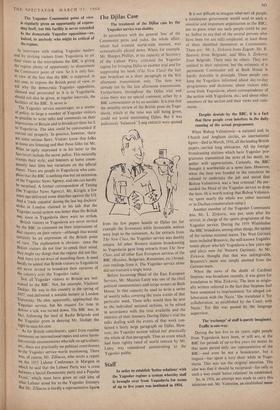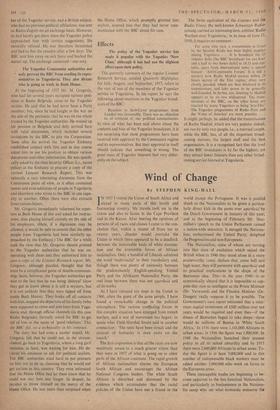Staff
In order to establish 'better relations' with the Yugoslav regime a system whereby staff is brought over from Yugoslavia for terms of up to five years was instituted in 1954.
It is not difficult to imagine what sort of people a totalitarian government would send to such a sensitive and important organisation as the BBC, nor to guess what use such people could be put to. Suffice to say that of the several persons who have been (or are still) employed, at least three of them identified themselves as Communists. These are : Mr. L. Zivkovic from Zagreb; Mr. B. Bozovic from Belgrade; and Miss S. Zivkovic from Belgrade. There may be others. They are entitled to their opinions; but the existence of a permanent Communist cell at Bush House is hardly desirable in principle. These people can keep the Yugoslays informed about day-to-day programmes and decisions; about visitors who come from Yugoslavia; about correspondence of the section with Yugoslavia, etc.; and about other members of the section and their views and com- ments.
Despite denials by the BBC, it is a fact that these people even interfere in the daily running of the actual programmes.
When Bishop Velimirovic—a national and, in Church and Anglican circles, an international figure—died in March, 1956, all the leading British papers carried long obituaries. All the foreign broadcasting stations which have Yugoslav pro- grammes transmitted the news of his death, to- gether with appreciations. Certainly, the BBC thought it worthwhile as a news item. However, when the item was handed to the translator he refused to undertake the job and stated that Bishop Velimirovic was a 'war criminal.' He per- suaded the Head of the Yugoslav service to drop the item. (It is worth noting that Bishop Velimiro- vic spent nearly the whole war either interned or in Dachau concentration camp.) Another member of the Yugoslav Communist trio, Mr. L. Zivkovic, was put, soon' after his arrival, in charge of the sports programme of the Yugoslav service. During the 1959 Wimbledon the BBC broadcast, among other things, the names of the various national teams. The West German team included Branovic, the well-known Yugoslav tennis player who left Yugoslavia a few years ago and plays now for Western Germany. As Mr. Zivkovic thought that that was unforgivable, Branovic's name was simply omitted from the German team.
When the news of the death of Cardinal Stepinac was broadcast recently, it was given for translation to Miss Zivkovic. The item as origin- ally written referred to the fact that Stepinac had been sentenced to imprisonment 'for alleged col- laboration with the Nazis.' She translated it 'for collaboration, as established by the Court, with Nazis.' Yet this was passed by the language supervisor.
The 'exchange' of staff is purely imaginary. Traffic is one-way.
During the last five to six years, eight people from Yugoslavia have been, or still are, at the BBC for periods of up to five years (or more). In that same period only one representative of the BBC—and even he not a broadcaster, but a linguist—has 'spent a very short while in Yugo- slavia. This was not the original intention. The idea was that it should be reciprocal—for only in such.a way could 'better relations' be established.
So, in 1956, an attempt was made to carry this intention out. Mr. Valentine, an established mem- ber of the Yugoslav service, and a British subject, who had no previous political affiliations, was sent to Radio Zagreb on an exchange basis. However, he had hardly got there when the 'Yugoslav police approached him with certain suggestions. He naturally refused. He was therefore threatened and had to flee the country after a few days. The BBC sent him away on sick leave and hushed the matter up. The.exchange continued—one-way.
The Yugoslav Communist authorities not only prevent the BBC from sending its repre- sentatives to Yugoslavia. They also dictate who is going to work in Bush House.
At the beginning of 1957 Mr. M. Gregovic, who had for several years occupied various posi- tions at Radio Belgrade, came to the Yugoslav section. He said that he had never been a Party member; but, since he had fought in the war on the side of the partisans, that he was on the whole trusted by the Yugoslav authorities. He wound up his position in Belgrade and duly arrived here with valid documents, which included several invitations by the I3BC to join the Corporation. Soon after his arrival the Yugoslav Embassy established contact with him and in due course asked him to use his position to obtain' various documents and other information. He was specifi- cally asked by the then Security Officer (i.e., secret police) at the Embassy to procure a copy of the current Listener Research Report. This was naturally a very interesting document from the Communist point of view, as it often contained names and even addresses of people in Yugoslavia and elsewhere who wrote to the BBC in one capa- city or another. Often there were also extracts from various letters.
Mr. Gregovic immediately informed his super- iors at Bush House of this and asked for instruc- tions, thus placing himself entirely on the side of his employers. (Here, if a digression may be allowed, it would be safe to assume that the other people from Yugoslavia had been similarly ap- proached by the Embassy.) The BBC for a while took the view that Mr. Gregovic should pretend to the Yugoslav authorities that he was co- operating with them and they authorised him to pass a copy of the Listener Research report. Mr. Gregovic, although puzzled, thought that this must be a complicated game of double-crossman- ship. Soon, however, the Yugoslav authorities got wise to the fact that he was being 'disloyal' (how they got to know about it is still a mystery, but it is not unlikely that they were tipped off from inside Bush House). They broke off all contacts with him, stopped the departure of his family (who were supposed to come and join him) from Yugo- slavia and, through official channels (in this case Radio Belgrade), formally asked the BBC to get rid of him in the name of 'good relations.' This the BBC did, on a technicality•in his contract.
The story has had even a nastier sequel. Mr. Gregovic felt that he could not, in the circum- stances, go back to Yugoslavia, where a long gaol sentence, at least, was waiting for him. He de- clared his intention to ask for political asylum. The BBC authorities tried hard, to put pressure on him not to do so, claiming that he would not get asylum in this country. They even intimated that the Home Office had let them know that he could not stay here any longer. In despair, he decided to throw himself on the mercy of the Home Office. He was more than surprised when the Home Office, which promptly granted him asylum, assured him that they had never com- municated with the BBC about his case.











































 Previous page
Previous page